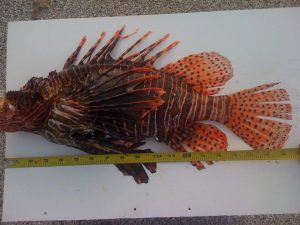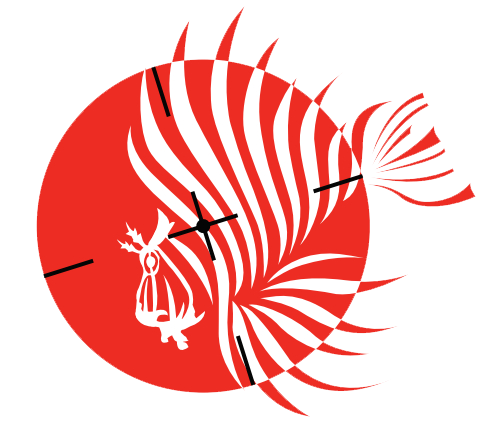Think you have a world, country or state record lionfish for largest lionfish caught by spear, in a net or on a fishing pole? Take a clear photo of it next to any standard tape measure or ruler measuring from the tip of the lips to the tip of the tail and send it to us via email here.
 The lionfish must be photographed whole and the body must be intact, though dorsal, pelvic and anal spines may be cut off in the interest of diver safety. The tape measure must lie flat on the measuring surface.
The lionfish must be photographed whole and the body must be intact, though dorsal, pelvic and anal spines may be cut off in the interest of diver safety. The tape measure must lie flat on the measuring surface.
It is best to submit multiple camera angles to ensure accurate evaluation.
We accept potential-record submissions from legally harvested non-native* invasive lionfish taken by freedivers and scuba divers using a spear (speargun, hawaiian sling, pole spear, ELF, etc) or hand-held net and anglers using a hook & line. Lionfish taken by cast nets, trawl nets, seine nets, etc., or from traps will not be considered.
All sizes are rounded down to the nearest centimeter. Lionfish must be at least one (1) centimeter larger than the current record holder to qualify for a new or subsequent record. Lionfish must be at least 36 centimeters (approximately 14 inches) to qualify for any vacant record.
In reference to identically-sized fish: the potential record submission entered first will stand as the qualifying record unless a Lionfish Hunters convened panel of not less than three (3) judges determines otherwise.
All decisions of Lionfish Hunters certifying officials are final and subject to published Lionfish Hunters regulations, verification and clarification. By sending in images for records submission, submitter certifies that they are the copyright owner of that image and grants the Lionfish Hunters an irrevocable license to use images on it’s website, social media accounts and in other derivative images that might be produced.
Current “Vacant Records” include all non-native* largest lionfish caught on “Hook & Line,” Breath-Hold Diving and from any unlisted countries and individual states of the United States bordered by the Western Atlantic Ocean, Caribbean Sea and the Gulf of Mexico where it is legal to harvest lionfish for sporting purposes.
The Lionfish Hunters acknowledges that there might have been bigger, longer, larger lionfish caught and recorded by the scientific community or by other sportsmen prior to the establishment of the Lionfish Hunters Unified Records program. However, if we do not have a potential-record entry of the fish as outlined by our regulations defining record submission requirements it is not in the spirit of the program to formally acknowledge the catch.
*Non-native invasive lionfish records submissions will only be considered from the following countries, nations and territories: Anguilla, Antigua and Barbuda, Argentina, Aruba, The Bahamas, Barbados, Belize, Bermuda, Bonaire, Brazil, British Virgin Islands, Cayman Islands, Columbia, Costa Rica, Cuba, Curaçao, Dominica, Dominican Republic, French Guiana, Grenada, Guadeloupe, Guatemala, Guyana, Haiti, Honduras, Jamaica, Martinique, Mexico, Montserrat, Navassa Island, Nicaragua, Panama, Puerto Rico, Saba, Saint Barthélemy, Saint Kitts and Nevis, Saint Lucia, Saint Martin, Saint Vincent and the Grenadines, Sint Maarten, Sint Eustasius, Suriname, Trinidad and Tobago, Turks and Caicos Islands, United States, United States Virgin Islands, Uruguay and Venezuela. Record submissions from lionfish legally harvested from the Mediterranean Sea are currently being considered pending further research.


My biggest in Puerto Rico was 16 inches. I saw one bigger but did escape! lol
I really enjoy your page.
All Best
JT
Just dove the clinton wreck pompano beach fl over 100 lions in one cargo hold i speared about 20 all huge average 12 to 18 inches. This is a deep site 175 ft so not much hunting goes on.
Thanks for getting as many as you could!
Can i ask why Bermuda isnt included? We a month ago we had one caught with a measurement of 19 inches – with photo and tape measure. Would be great to participate in this
Only because we probably have not received a submission? Send in to me directly at scottharrell@gmail.com.
Ah, I see the problem (and have corrected it) I just inadvertently missed Bermuda in the list – though we did have Sean Maiorano’s previous Bermuda record posted on the records page.
CIEE research station recorded 47 cm in Bonaire. The picture is on their website.
Hi,
For measurement, is the mouth open or closed? Is it to the end of the spine (meaty part of the tail: or to the end of the tail fin?
Thanks
Mouth can be open (since we’ve allowed it that way in the past) and the measurement is to the very tip of the tail. Total length.
Hi. I understand you’ve allowed open-mouth measurements and so will continue, but that is inaccurate and an incorrect method. Fish measurements are meant to be taken with the mouth closed. Leaving the mouth open actually adds quite a bit extra to the fish.
Corey, we cover this time to time and thanks for sharing your concerns. I understand exactly what you are saying about a right way and a wrong way. In our instance, we decided on the rules based upon what we were working with; most lionfish submissions are submitted by divers who do not have spearfishing tournament experience. If records are measured the same way, then, in theory, longest is still longest.
Hey i caught one 15.20 n weighed 1lb. 11.2oz. On a rod n reel state record info is being looked at n beats igfa all tackle world record by 1.2 oz. I need a email address from yall so i can submitt official pics witnesses
You can submit to me at scottharrell [@] gmail [dot] com.
Hello I just did 4 month on Bonaire where I’m a very active lionfish hunter for years already and this year I made my E.L.F. stronger and longer an can now catch the big ones. Unfortually we did not fotograf it when messured , it is absolutly a Bonaire record with his 46cm
So next winter we will messure and fotograf it correctly.
Greetz Ton
I have emailed you 2 times with photos of the 17 inch lionfish that i got the other day in Puerto Rico ( which has no set record on your site ) and you have never responded back to me
I just shot a LF of Panama City, Fl. that weighed 2.5# according to a cheap set of electronic scales. I did not measure length. Why do you use length for records instead of weight.
Brian